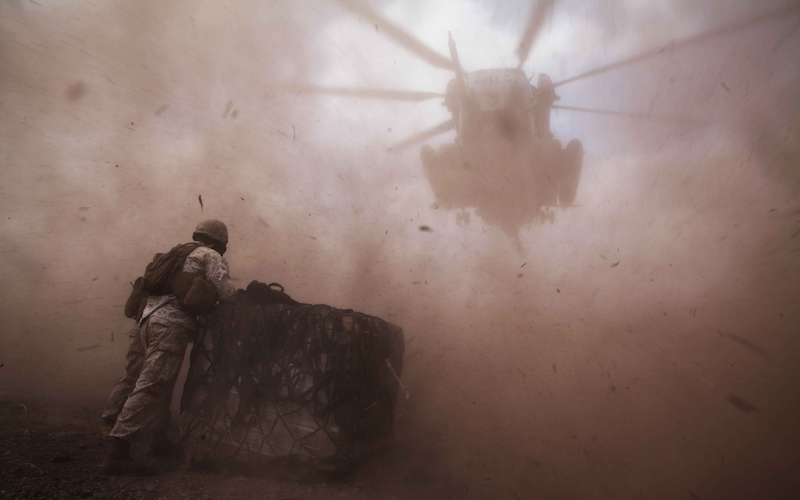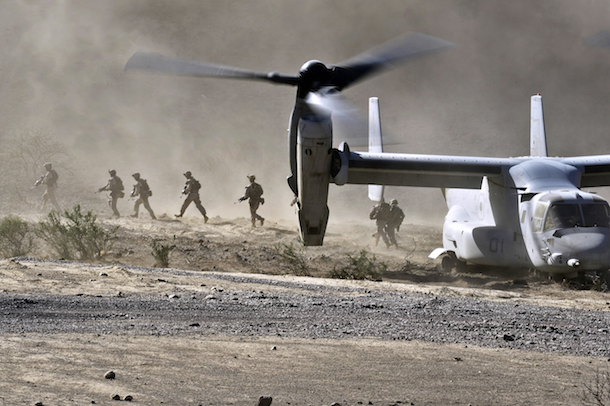
Is Djibouti a Reliable Partner in the Fight Against Terrorism?
Sandwiched between basket-case Somalia and failed Eritrea, Djibouti is a surprising safe heaven of stability in the Horn of Africa. Thanks to its geographical position, some 20 miles off the coast of war-torn Yemen, this small, impoverished country has become in the past 15 years the West’s unsung hero in the never-ending war on terror and piracy. Serving as a military foothold for the U.S., France, Germany and Japan, its strategic importance for the West is unparalleled in Africa. More than 4000 U.S. personnel are deployed on the ground at the Camp Lemonnier military base, a halcyon inherited by Washington from the former French colonial masters.
According to a sweeping investigation carried out by the Washington Post’s Craig Whitlock in 2012, “Camp Lemonnier is the centerpiece of an expanding constellation of half a dozen U.S. drone and surveillance bases in Africa.” Indeed, Djibouti is now the epicenter of America’s drone shadow war started in the aftermath of 9/11. The military base saw a multibillion-dollar revamp and is now home to hundreds of secretive Special Forces operatives, rows of helicopters and fighter jets plus an undisclosed number of Predator drones. Together they occupy a slice of land of some 2 square kilometers in a country the size of New Jersey.
Under the cover of the government’s tantrum provoking refrain of “we can neither confirm nor deny,” surveillance infiltrations, counter-terrorism raids, pirate take-downs and terrorist assassination have been staged from Camp Lemonnier.
Drones that have as port of call this low-profile African base took out headline grabbing targets such as Aden Hashi Farah, a top al-Qaida Somali operative, or Qaed Salim Sinan Al Harethi, one of the perpetrators of the 2000 attack on the U.S.S. Cole.
An article published by Tom’s Dispatch in September 2014 cited an unreleased Pentagon investigation into the military’s “ill-planned” war for hearts and minds in Africa, which points that operations conducted from Camp Lemonnier were kept hidden under press releases touting humanitarian projects, further surrounding the activities of the base in an impenetrable shroud of secrecy.
As of 2012, the base played a central role in three classified military operations, codename Copper Dune, Jupiter Garret and Octave Shield. As Africa Command declined to provide details for the latter two over security restrictions, we only know that Copper Dune is the name assigned to the military’s counterterrorist operations in Yemen. Moreover, government and military officials have repeatedly refused calls to answer journalists’ questions and the few investigations conducted in the bases’ affairs were largely based on public-records requests.
What is clear though is that the U.S. heavily relies on this military base, after Washington recently renewed its lease contract for 10 years (with an option for extension for 10 more), even as the Djiboutian government doubled the rent. Indeed, upkeep costs jumped from roughly $30 million to $63 million per year, to which an extra $7 million in economic aid to the government was added. The announcement came following a 40-minute meeting at the White House between Barack Obama and his Djibouti counterpart, Ismail Omer Guelleh. “Obviously, Camp Lemonnier is extraordinarily important not only to our work throughout the Horn of Africa but throughout the region,” Obama was quoted as saying in the New York Times.

The French government, along with the Japanese and German governments have closed similar deals in order to secure access to the strategic port of Djibouti, Africa’s largest. This allows them to maintain a naval presence in the pirate infested waters of the Bab-el-Mandeb strait and protect essential trade lanes. Even Moscow tried to negotiate a military presence in the tiny African country, but its efforts were rejected by the government. But this favorable status quo is now under threat, as the African continent is undergoing its most dramatic political shift since the fall of the Iron Curtain.
Turning East?
For the better part of a decade, China has been courting strategic “choke points” in Africa, striking generous military deals with countries such as Zimbabwe, Nigeria, Algeria or Ethiopia. In 2013, China became Africa’s largest trading partner, with over $200 billion in total trade, surpassing the E.U., the U.S. and Japan. As a point of reference, bilateral trade between the two blocs stood at a paltry $12 billion in 2002.
In recent years though, Djibouti seems to have succumbed to China’s buying spree in Africa. A series of ambivalent deals closed with Beijing on delicate matters of infrastructure and defense could very well signal a change of course in the country’s future strategy.
Since 2008, China has been involved in the Gulf of Aden due to its first major security operations outside its sovereign territory aimed at protecting Chinese vessels. For this, Beijing has extensively relied on Djibouti’s port, so much so that it even bought a 23.5% share for $185 million in 2013. Moreover, the two countries have signed a contract to start building a new multi purpose port in 2013, a railway link between Ethiopia’s capital Addis Abada and the capital of Djibouti plus a far-reaching defense partnership to enhance the capacities of the African country’s armed forces.
Naturally, the U.S. didn’t take these developments lightly, and National Security Advisor Susan Rice expressed deep concerns over China’s plans for an aero-naval base in the Obock region during a meeting had with the Djiboutian President earlier this year. Her visit was part of an effort mounted by Washington to maintain Djibouti in its sphere of influence.
Djibouti’s foreign policy agenda cannot be understood without looking at the nation’s haphazard political class. Guelleh, who has ruled the country with an iron hand since he succeeded his uncle Hassan Gouled Aptidon in 1999, has become increasingly erratic in recent years. Infighting between allies, coupled with his failing health, have led the president take some unexpected decisions. A strategic partnership with Dubai, which saw trade links between the two countries expand exponentially thanks to a $400 million investment in a new container terminal at Doraleh, is now teetering after the principal business agent in the Dubai venture challenged Guelleh’s decision to run for a third consecutive term in 2010.
This internal fight prompted the Djiboutian government to rescind Dubai’s concession at Doraleh, accusing the former ally of receiving bribes while negotiating the concession agreement. This internal rivalry between Guelleh and opposition leader Abdourahman Boreh has escalated to such an extent that it now threatens Djibouti’s foreign agenda with Dubai. Such signs do not bode well for the country’s other allies.
According to a paper released by the Chatham House in April 2013, “Djibouti’s strategic role as host to US, French and other foreign military facilities is unlikely to change in the medium term.” With Djibouti’s strategic importance beyond a shadow of a doubt, the only question that remains unanswered is whether the West can actually trust this small country wedged between so many competing spheres of influence.

